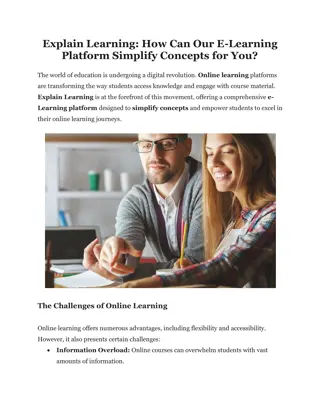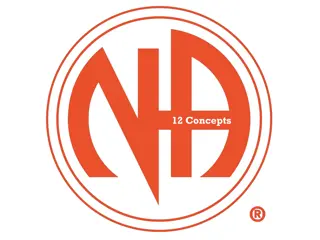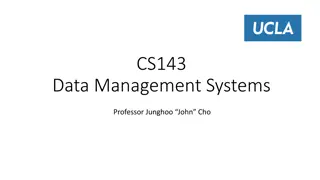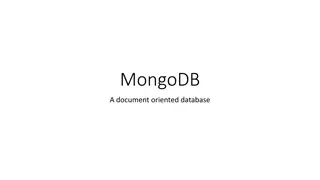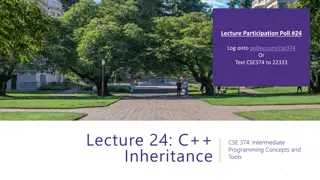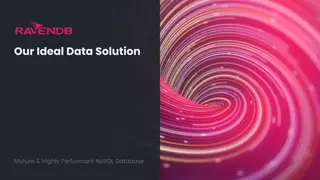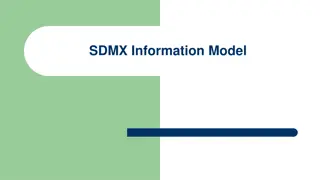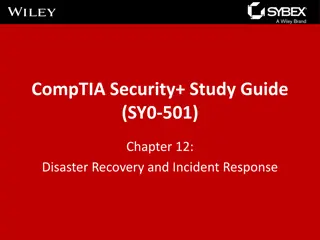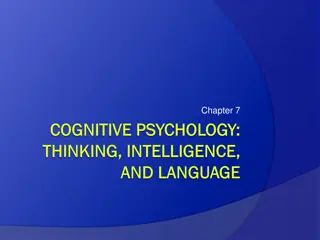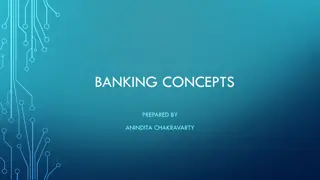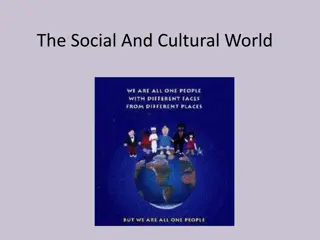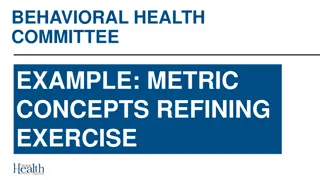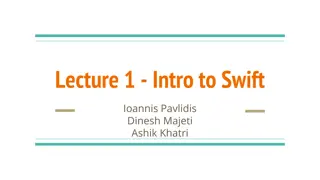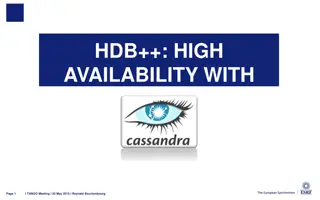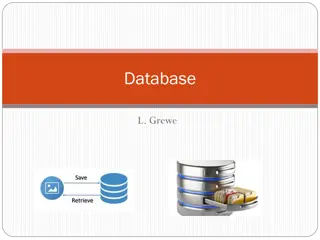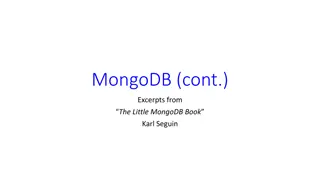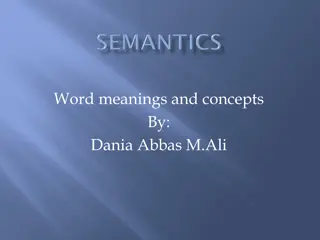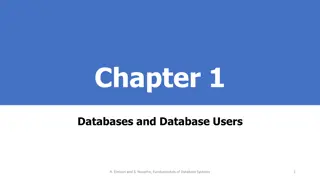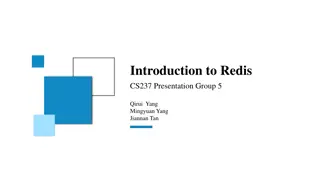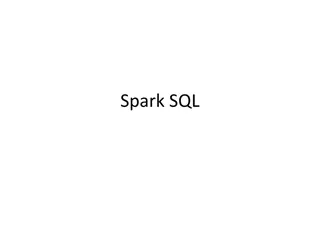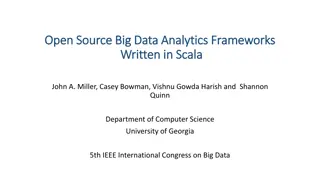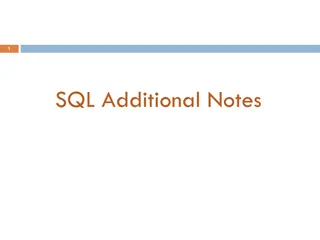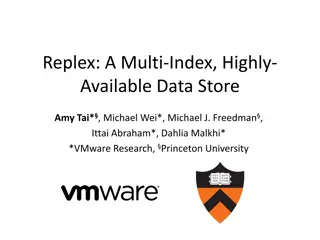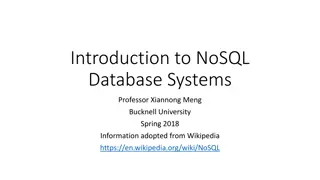Understanding Machine Learning Concepts: Linear Classification and Logistic Regression
Explore the fundamentals of machine learning through concepts such as Deterministic Learning, Linear Classification, and Logistic Regression. Gain insights on linear hyperplanes, margin computation, and the uniqueness of functions found in logistic regression. Enhance your understanding of these key
6 views • 62 slides
Contrasting Concepts in Political Science: Normative vs Descriptive Approaches
Normative and descriptive concepts in Political Science explore contrasting viewpoints on how things should be versus how they actually are. While normative claims focus on value judgments, descriptive claims deal with facts. These concepts complement each other by providing both theoretical and pra
0 views • 10 slides
Explain Learning How Can Our E-Learning Platform Simplify Concepts for You
Explain Learning is at the forefront of this movement, offering a comprehensive e-learning platform designed to simplify concepts and empower students to excel in their online learning journeys. Know more \/\/explainlearning.com\/blog\/explain-learning-e-learning-platform-simplifies-concepts\/
1 views • 4 slides
NA Service Structure: 12 Concepts for Effective Leadership & Accountability
The NA service structure is guided by 12 Concepts to ensure effective leadership, accountability, and decision-making within Narcotics Anonymous groups. These Concepts emphasize the importance of group unity, delegation of authority, and spiritual guidance in fulfilling NA's primary purpose. Trusted
1 views • 22 slides
Comprehensive Overview of Human Resource Management (HRM) Concepts
Explore the key aspects of Human Resource Management (HRM) including concepts, functions, and development. Learn about HRM vs. Personnel Management, functions of HR Manager, and the differences between HRM and HRD. Dive into the definition of HRM, concepts of HRM, functions of personnel management,
1 views • 24 slides
Introduction to CS143 Data Management Systems Course
This course, taught by Professor Junghoo John Cho, covers topics such as data management systems, SQL, RDBMS, and NoSQL databases. Students will learn to store data, interact with databases using SQL, and understand the workings of DBMS. The course objectives, structure, staff information, lecture f
1 views • 21 slides
MongoDB vs. Relational Databases: Myth vs. Reality in NoSQL Design
MongoDB is a document-oriented database that challenges traditional relational databases by offering flexible schema designs. While myths suggest no need for schema design or relationships in MongoDB, the reality emphasizes the importance of thoughtful schema design and choice in data relationships.
2 views • 21 slides
Intermediate Concepts in C++ Inheritance - Lecture Participation Poll #24
Explore the advanced topic of C++ inheritance through Lecture Participation Poll #24 in CSE 374. Dive into the concepts with examples and code snippets covering class inheritance, virtual functions, and more. Don't miss out on this opportunity to enhance your understanding of intermediate programmin
0 views • 31 slides
RavenDB: A High-Performance NoSQL Database Solution
RavenDB is a mature and highly performant NoSQL database designed to meet the evolving needs of cloud applications, IoT devices, and distributed environments. Offering features like fully ACID transactions, scalability, and exceptional performance, RavenDB has become a popular choice for organizatio
1 views • 20 slides
Understanding Data Models in the Context of SDMX
Explore the importance of properly describing data, developing a data model for exchange, and identifying concepts in the SDMX context. Figures vs. data on the number of touristic establishments in Italy, along with visuals, illustrate key concepts like Data Structure Definitions. Learn how to ident
0 views • 46 slides
Understanding Hinduism: Beliefs, Practices, and Concepts
Hinduism, originating in the Indus Valley, is a diverse religion with beliefs in karma, reincarnation, and a multitude of deities. Concepts like Atman, Dharma, and Varna play vital roles in shaping Hindu philosophy and practices. Explore the essence of Hinduism through its ancient texts, traditions,
8 views • 50 slides
Disaster Recovery and Incident Response Concepts
This content covers the essential concepts of disaster recovery, incident response, penetration testing, vulnerability scanning, and business continuity planning in the context of cybersecurity. It explains the goals and steps involved in penetration testing, vulnerability scanning tasks, business c
2 views • 15 slides
Understanding Cognitive Psychology: Thinking, Intelligence, and Language
Cognitive psychology explores the processes of thinking, intelligence, and language. It delves into mental activities such as organizing information, problem-solving, and forming concepts. Concepts like superordinate, basic level, and subordinate concepts are discussed alongside problem-solving meth
0 views • 37 slides
Understanding Theories and Concepts in Research
The content delves into the fundamental concepts of theories and variables in research. It discusses the nature of theories, including descriptive, explanatory, and predictive theories. Additionally, it examines the role of concepts in providing identity and meaning to objects and phenomena. Through
2 views • 55 slides
Understanding Banking Concepts and Monetary Policies
Explore key banking concepts such as Currency Deposit Ratio, Reserve Deposit Ratio, Statutory Liquidity Ratio, High-Powered Money, and their significance in regulating the money supply and liquidity in an economy. These concepts shed light on the relationship between currency, deposits, reserves, an
0 views • 14 slides
Software Engineering Design Principles and Concepts
The chapter discusses the essential principles and concepts in software design, highlighting the four key design models - data design, architectural design, interface design, and component-level design. It emphasizes the importance of traceability to the analysis model, minimizing the gap between so
0 views • 36 slides
Understanding Social and Cultural Concepts in Society
Explore the fundamental concepts of persons, society, culture, environment, time, power, and authority. Learn how these concepts interlink and shape interactions within a society over time. Gain insights into the importance of individual uniqueness in societal structures, the dynamics of social grou
1 views • 10 slides
Understanding Probability: Experimental and Theoretical Concepts
Probability is the measure of the likelihood of an event happening, with experimental and theoretical probability being key concepts. Experimental probability involves determining probabilities through experience or experiments, while theoretical probability can be calculated without prior experienc
2 views • 23 slides
Farmington Tiger Football Youth Offensive Formations and Concepts
In the Farmington Tiger Football youth program, coordinated offensive formations and concepts are emphasized for players in grades 3-12. The program aims to maintain consistency in offensive strategies while allowing some flexibility for coaches to incorporate age-appropriate concepts. Various forma
0 views • 54 slides
Teaching Basic Concepts to Deaf/Hard-of-Hearing Children
Teaching basic concepts is crucial for deaf/hard-of-hearing (D/HH) children as it forms the foundation for learning and thinking. These concepts—such as location, number, descriptions, time, and feelings—are best learned through concrete examples. D/HH students benefit from focused, one-at-a-tim
0 views • 12 slides
Overview of Laws and Concepts in Correctional Institutions
Understanding key legal concepts in correctional institutions, including probable cause, crimes, parties to crimes, types of intent, and classifications of evidence and crime. Explore the definitions and implications of these concepts in the context of the criminal justice system.
0 views • 41 slides
Refining Metric Concepts for Behavioral Health Committee
This example explores the refinement of metric concepts for a behavioral health committee focusing on improving outcomes related to diverting individuals with behavioral health needs from arrest or incarceration. It delves into two key concepts: availability of drop-off locations and walk-in service
1 views • 6 slides
Understanding Basic Concepts of Information Technology
Explore fundamental concepts in Information Technology including basic terms, types of computers, hardware, software, and general IT concepts. Learn about different types of computers such as supercomputers, mainframe computers, servers, networked computers, personal computers, laptops, and handheld
1 views • 13 slides
Physics Concepts Illustrated with Images
Explore various physics concepts such as sound waves, light bending, resonance, wave velocity, and more through visually engaging images and related questions. Concepts like guitar string vibrations, compression waves, refraction of light, tuning fork vibration, and sound wave frequency are explaine
2 views • 22 slides
Introduction to Swift: Evolution, Overview, and Basic Concepts
Swift, a general-purpose and multi-paradigm programming language, was developed by Chris Lattner in 2010. Its evolution, from the initial release in 2014 to becoming open source in 2015, has led to the upcoming Swift 4.0 release in 2017. This language blends object-oriented principles with functiona
0 views • 21 slides
Agile Project Development with Ruby on Rails at The Forge
The Forge is a website created by Bryan Denslow to facilitate agile project development using Ruby on Rails. Projects are managed with Epics, each containing tasks to be completed. Users can collaborate, add or remove team members, and provide comments on tasks. The platform utilizes Ruby on Rails f
0 views • 22 slides
Exploring Data Beyond the Relational Model
Serge Abiteboul delves into the world beyond the relational model, challenging established norms in industry and academia, aiming to facilitate application development and enhance performance. The lecture covers topics such as organization trees, XML graphs, object databases, NoSQL, OLAP, and more,
0 views • 52 slides
Exploring NoSQL Systems and Database Models in Data Processing
Delve into the realm of NoSQL databases and their differences with relational databases. Discover the landscape of database models, including key-value and document stores, along with insights on Amazon DynamoDB's object versioning system.
0 views • 67 slides
Understanding Cassandra - A High Availability Database Solution
Cassandra, a massively scalable open-source NoSQL database, offers high availability and resilience with its peer-to-peer architecture, replication, and continuous availability across multiple data centers. Its query language, CQL, provides SQL-like functionality with some limitations. Explore the f
0 views • 67 slides
Understanding Database Management Systems and Data Storage
Explore the world of Database Management Systems (DBMS) and learn about the evolution of data storage from flat-file to relational databases. Discover the key features of a DBMS, different database types, administration tools, SQL and NoSQL databases, CAP theory, and considerations for choosing betw
0 views • 32 slides
Exploring MongoDB: Array Operations, Data Modeling, and NoSQL Concepts
Delve into MongoDB array operations such as accessing array elements with $slice, data modeling concepts, and the absence of joins in NoSQL systems. Learn how MongoDB handles relationships, querying nested data, and the nuances of data modeling in comparison to relational databases.
0 views • 43 slides
Understanding Word Meanings and Concepts by Dania Abbas M. Ali
Explore the interconnected world of word meanings and concepts as articulated by Dania Abbas M. Ali. Learn how our stored knowledge organizes experiences into categories, enabling recognition and recollection. Concepts form complex networks, linking various ideas together. The relationship between l
0 views • 57 slides
Overview of Databases and Recent Developments in Database Systems
Explore the fundamentals of databases, including types, applications, users, and advantages. Learn about traditional and recent database applications, such as social networks, search engines, and emerging technologies like Big Data systems and NOSQL. Understand the concept of databases as a collecti
0 views • 30 slides
Understanding Redis: A Key-Value NoSQL Database Overview
Redis is a flexible in-memory data structure store that acts as a database, cache, and message broker. It follows a key-value store principle, offering various data structures like strings, lists, sets, and more. Redis allows users to store a large amount of data without the limitations of relationa
0 views • 15 slides
Understanding NoSQL: Evolution and Key Concepts
Exploring the world of NoSQL databases, this comprehensive overview delves into the history, key features, and evolution of NoSQL technology. From the motivations behind its development to the various systems and papers that shaped its landscape, this content provides insights into how NoSQL has rev
0 views • 19 slides
Evolution of Database Systems: A Spark SQL Perspective
Explore the evolution of database systems, specifically focusing on Spark SQL, NoSQL, and column stores for OLAP. Learn about the history of parallel DB systems, common complaints, the story of NoSQL, and the advantages of column stores for data aggregation and compression in OLAP scenarios.
0 views • 25 slides
Evolution of Scala-Based Open Source Big Data Analytics Frameworks
The evolution of big data analytics frameworks written in Scala, such as Spark, Kafka, and Samza, has led to significant improvements in parallel execution and support for NoSQL databases. Scala's functional and object-oriented programming capabilities have enabled the development of powerful analyt
0 views • 16 slides
SQL Advanced Concepts Overview
This content covers various advanced SQL concepts such as Grouping and Aggregation, Execution Order, Joins, Maximum Finding, and Line Formatting. It provides examples and explanations on how to use these concepts effectively in SQL queries. The visual aids help in understanding the concepts better.
0 views • 17 slides
Exploring NoSQL Database Scalability Using Indexing Techniques
Dive into the world of NoSQL database scalability by understanding how indexing enables richer queries and how local indexing impacts partitioning, updates, and lookups across distributed databases.
0 views • 59 slides
Understanding NoSQL Databases in Modern Data Management
NoSQL databases offer innovative storage and retrieval mechanisms for diverse data types, deviating from traditional relational databases. This article explores the history, definition, advantages, challenges, and types of NoSQL databases, shedding light on their pivotal role in current data managem
0 views • 11 slides


